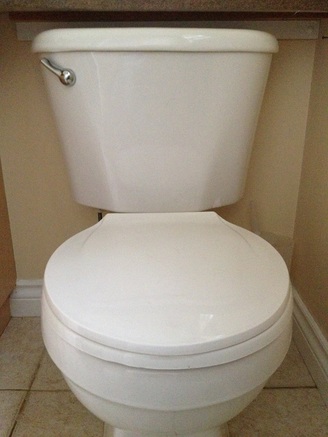
Breastfed babies seem to have more poops than formula feed babies by about a factor of two (1), but the range is quite variable. For example, it has been found that per week 2-67 poops have been reported for breastfed babies and 3- 60 for formula fed babies (1).
I get many questions about constipation in babies. For breastfed babies, they may go several days or longer without a poop and not be considered constipated (1). I don’t recommend giving your baby prune juice or even water for constipation. For exclusively breastfed babies I look at how long it’s been since the last bowel movement and I encourage feeding the baby on demand. Often this is all that is needed. If you are giving your baby formula, make sure you are using the correct amount of water to mix the formula. Infant massage (bicycling of legs) can also work well- be sure to be prepared if this helps get things moving for your little one!
After solid food is introduced poop can really change in both colour and consistency. I am commonly contacted by worried parents who see food appearing in their baby’s diapers that looks the same as it did when it entered their body. This is typically not a concern as a large part of this is the baby learning how, and becoming better at, mashing the food up before swallowing it so that it is easier digested by the body. As your baby becomes more skilled at mashing and/or chewing, this lessens.
For babies who are 6 -12 months the number of poops per week have been reported as 5- 28 (1). However, as children get older their gut becomes better at conserving water and this makes for fewer bowel movements, so that by ages 1-3 they are reported to have 4-21 poops per week (1).
So, what is normal for you baby? The answer is that it depends on age and what they are eating and drinking (3). Offering your baby a variety of foods and textures, and depending on age, maintaining their fluids via breast milk or formula or having water available for them can help keep constipation at bay. I also encourage parents to offer foods that are high in fibre and that contain probiotics. If you are increasing high fibre foods, be sure to increase slowly and increase fluids accordingly. I encourage parents not to compare your baby with others (3). If your baby’s poop is soft and there doesn’t seem to be any pain, I encourage parents to not worry (3).
Lastly, know that you are not alone. I find that most parents I deal with have questions about their baby’s poop.
Wondering about your baby’s poops? Contact Jill, Nurture The Future’s Registered Dietitian at [email protected]
References:
1 http://www.pennutrition.com/KnowledgePathway.aspx?kpid=8534&trid=19628&trcatid=38
2 http://www.ncbi.nlm.nih.gov/pmc/articles/PMC1766693/pdf/v045p0II60.pdf
3 http://www.pennutrition.com/viewhandout.aspx?Portal=UbY=&id=JMznXQI=&PreviewHandout=bA==

 RSS Feed
RSS Feed

.png.aspx?width=150&height=150)
